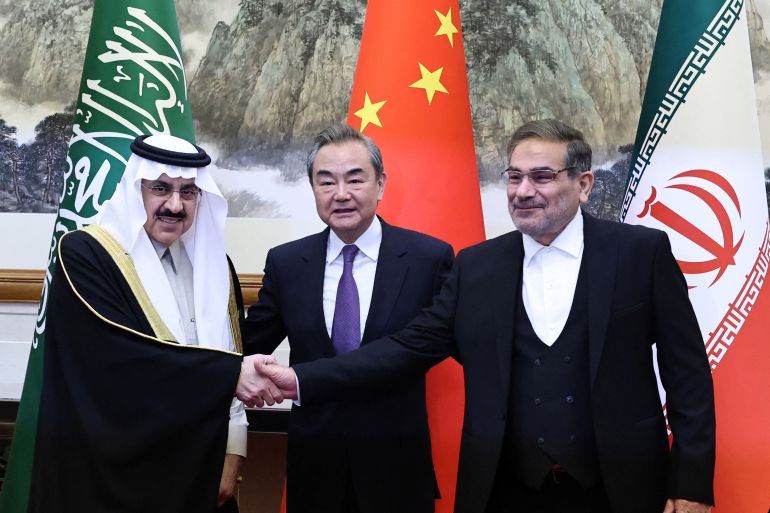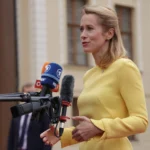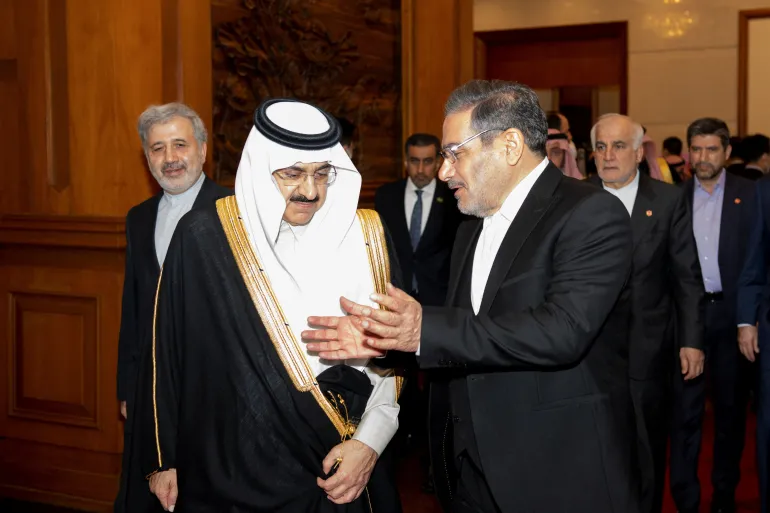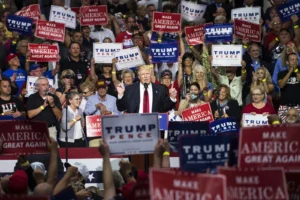The China-brokered detente can improve regional stability and benefit US interests in the Middle East, experts say.
The United States has described the China-brokered normalisation deal between Saudi Arabia and Iran as a “good thing”, despite the message it may send about waning US influence in the region.
The pact between Riyadh and Tehran, announced last week in Beijing, merely cements the reality of China’s growing role as a significant trade — and now diplomatic — partner in the Gulf, analysts say.
They add that Washington, with its confrontational approach to Tehran, was not in a position to broker the rapprochement, but it can still benefit from it despite the alarm some US hawks have sounded.
“The fact that Tehran and Riyadh sort of decided to bury the hatchet of war is good for everybody,” said Jorge Heine, a professor at Boston University.
“It’s good for the United States. It’s good for China. It’s good for the Middle East.”
Heine, who previously served as Chile’s ambassador to China, said the pact between the two Middle East rivals was China’s “breakthrough into the big leagues of diplomacy”, but that does not mean it is a setback for the US.
He told Al Jazeera, however, the agreement should make Washington rethink its confrontational policies towards other countries.
The Tehran-Riyadh rapprochement follows years of tensions that have spilt across the Middle East, most notably in Yemen, where the conflict between the Saudi-backed government and Iran-allied Houthi rebels has spurred an immense humanitarian crisis.

China’s role
The agreement’s exact details have not been made public, but a joint statement on March 10 said the pact affirms “the respect for the sovereignty of states and the non-interference in internal affairs of states”.
The two countries also agreed to resume diplomatic relations that had been suspended since 2016 and revive security and cultural pacts going back decades.
Iran and Saudi Arabia had held previous rounds of talks in Iraq and Oman. Last week’s pact, however, was struck in China, with Beijing’s top diplomat Wang Yi present to shake the hands of Iran’s Supreme National Security Council Secretary Ali Shamkhani and Saudi national security adviser Musaad bin Mohammed Al Aiban.
The joint statement credited Chinese President Xi Jinping for the “noble initiative” of bringing Saudi Arabia and Iran together.
Xi visited Saudi Arabia in December last year and, in February, met with Iran’s President Ebrahim Raisi in China.
Analysts say the Chinese role in securing the agreement should not worry policymakers in Washington, which has made competition with Beijing a top policy priority.
Dina Esfandiary, senior Middle East and North Africa adviser at the International Crisis Group think tank, said the detente will “increase regional stability potentially”, which is also a Washington policy objective.
She added that the US remains by far the preferred security partner for Gulf Arab states.
China is a leading importer of Gulf oil, both from Iran and Saudi Arabia. The US, meanwhile, has largely moved away from Middle East energy imports as it increased its production capacity at home.
“Because of the economic clout that China has in the region, inevitably its importance is growing,” Esfandiary told Al Jazeera.
She added that a long-term worry for the US is that growing Chinese influence could eventually diminish Washington’s sway over its Gulf allies.
‘A good thing’
For now, US officials are not panicking over that prospect — at least not publicly.
“With regard to the agreement reached between Saudi Arabia and Iran with China’s involvement, from our perspective, anything that can help reduce tensions, avoid conflict and curb in any way dangerous or destabilising actions by Iran is a good thing,” US Secretary of State Antony Blinken told reporters on Wednesday.
Gerald Feierstein, senior fellow on US diplomacy at the Middle East Institute think tank, said the Chinese involvement in the deal may have been overstated, citing the talks that already took place in Iraq and Oman.
The deal “is consistent with what the US has seen as the right way forward, which is to reduce tension and to try to bring Iran back into the international community in some way”, Feierstein said.
He added that the US’s absence from the three-way handshake in Beijing does not mean much because Washington does not have relations with Tehran.
“The simple fact of the matter is that the US could not have played this role,” Feierstein, a former US diplomat who served as ambassador to Yemen, told Al Jazeera.
He said the detente is not a Saudi Arabian slight to the US. Rather, Feierstein sees it as a reassertion of the kingdom’s strategic approach of not taking sides in the great power competition.
He noted that, at around the same time as its normalisation pact with Iran, Saudi Arabia also provided aid to Ukraine and struck a $37bn deal with the US aircraft company Boeing – a move the White House praised last week.
The nuclear file
Where the detente may complicate things for Washington is in its efforts to contain the Iran nuclear programme. US President Joe Biden has repeatedly pledged that he would not allow Tehran to obtain a nuclear weapon, which Iran denies seeking.
But multiple rounds of indirect talks between Washington and Tehran since 2021 have failed to restore the 2015 deal that saw Iran scale back its nuclear programme in exchange for lifting sanctions against its economy.
The Biden administration now says a return to the nuclear pact, known as the Joint Comprehensive Plan of Action (JCPOA), is “no longer on the agenda” as it continues to pile sanctions on Iran.
The rapprochement may help Tehran break its economic isolation, with Saudi officials already talking about starting investments in Iran once the deal is implemented.
Despite the stalled efforts to restore the JCPOA, US officials say diplomacy is the best way to address Iran’s nuclear programme. Still, Washington has not ruled out a military option against Iran’s nuclear facilities.
“We have been very clear that we will, through all means necessary, ensure that Iran never acquires a nuclear weapon,” the State Department said earlier this month.
Feierstein said the Iranian-Saudi deal makes a hypothetical US or Israeli military attack against Iran more difficult. Without Saudi Arabia being “part of that effort”, whether by allowing its territory to be used for military operations or by allowing aircraft to pass overhead, an attack on Iran would be “much more complicated”, Feierstein explained.
Annelle Sheline, a research fellow at the Quincy Institute for Responsible Statecraft, a US think tank that opposes military interventions, agreed with that assessment. But she said the complications might be a good deterrent for Washington.
“It would certainly not be in the US interest to get dragged into a war between Israel and Iran, which is the way things seem to be going for the past several weeks and months,” Sheline told Al Jazeera.
She added that the Iran-Saudi Arabia rapprochement makes such a confrontation less likely because the Israelis are now “less confident of a kind of Arab coalition coming in behind them” as support.
Source: Aljazeera

















Add Comment